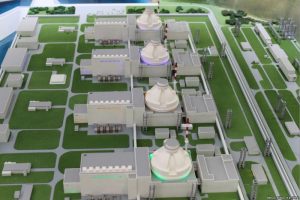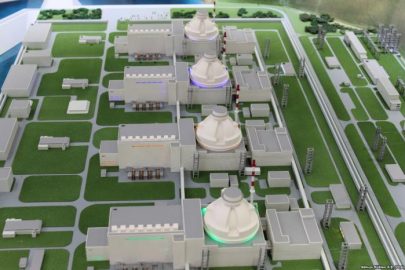Turkey plans to build a third nuclear power plant in an effort to further reduce its dependence on imported energy. The project is part of President Recep Tayyip Erdogan’s “2023 Vision,” marking 100 years since the foundation of modern Turkey and make Turkey one of the world’s top ten economies.
In 2007, the Turkish government began its first push in the 21st century to construct a nuclear power plant, in passing “The Law on Construction and Operation of Nuclear Power Plants and Energy Sale.”
This kick-started the negotiations that awarded Russia’s state-owned nuclear energy corporation, Rosatom, a contract to build Turkey’s first nuclear power plant (NPP) in Akkuyu, located in the southern Mersin province on the shores of the Mediterranean.
The Akkuyu NPP
President Recep Tayyip Erdogan and his Russian counterpart Vladimir Putin launched the construction of the Akkuyu plant at a ceremony in Ankara in early April 2018.
Erdogan noted that “Currently, 31 countries produce a significant amount of electricity from 450 nuclear power plants. Also, in 16 countries, 55 nuclear power plants are under construction. And today we can say that the Akkuyu power station, the foundation of which we are laying today, is the 56th.”
“In 2023, we will put into operation the first unit and Turkey will thereby join those countries that use nuclear energy … On the anniversary of our republic, we will crown this work with success.”
Putin said, “We have an ambitious task – to launch the first power unit in 2023, timed to coincide with the 100th anniversary of the founding of the Republic of Turkey. Together with my dear friend Recep Tayyip Erdogan, we have agreed that we will do everything in order to fulfill this task.”
The launch of the power plant came two weeks after Turkey suffered its most serious nationwide power cut in 16 years which exposed the shortcomings of its energy system.
The Akkuyu nuclear power station will boast four reactors, each with a capacity of 1,200 megawatts. The plant will meet 10 percent of Turkey’s energy needs.
Rosatom Director General Alexey Likhachov said on July 1, 2018, that “Rosatom is building in Turkey a cutting edge, tried and tested (Generation III+) nuclear power plant featuring four power units based on the Russian VVER-1200 design which meets the world’s highest safety standards.”

He added that “The model we are building at Akkuyu is already being built in a series. Unit 6 of Novovoronezh NPP and unit 1 of Leningrad NPP II, based on the same design, are already up and running, with the former in a commercial operation and the latter launched in February 2018. The safe and efficient operation of these units underscores the reliability of our technologies.”
Environmentalists have raised alarm over safety issues but the Turkish authorities have swatted away concerns that the Akkuyu facility lies in a seismic zone, saying it can resist quakes registering up to nine on the Richter scale.
Project Milestones
– The Akkuyu project is based on an inter-governmental agreement signed between Russia and Turkey in May 2010.
– In October 2011, JSC Akkuyu Nuclear received a site license.
– In November 2013, its site report received approval.
– Turkish Energy Minister Taner Yildiz and the head of Rosatom, Sergei Kiriyenko, on April 14, 2015, laid the foundation stone for the construction of the power station.
– In June 2017, Rosatom has nominated Yuriy Galanchuk as the General Manager of Akkuyu Nuclear Joint Stock Company. Mr. Galanchuk has 30 years of experience in the sector.
Russia is using a build-own-operate model for the project, whereby it provides the financing, operation, and management of the plant. The first unit is scheduled to start operations in 2023, with the other three units following by 2025.
Turkey concluded a contract with the Russian company Rosatom on a large reactor complex and a similar agreement was concluded with a Japanese-French consortium. President Erdogan also announced yet another power plant.
Turkey’s push to advance its own policies of energy security has been a long-time strategic goal, especially since the country is highly dependent on foreign energy imports.
Russia has ostensibly been using nuclear technology as means to increase bilateral relations and to gain regional influence in spite of western sanctions.
Given Erdogan’s dream of reviving “Ottomans time” and his vision of Turkey as a regional power in the Middle East, Turkey has to join the regional nuclear race. Otherwise, Turkey will remain second class – a position that Erdogan cannot and will not accept.
Source: israeldefense
Ask me anything
Explore related questions





